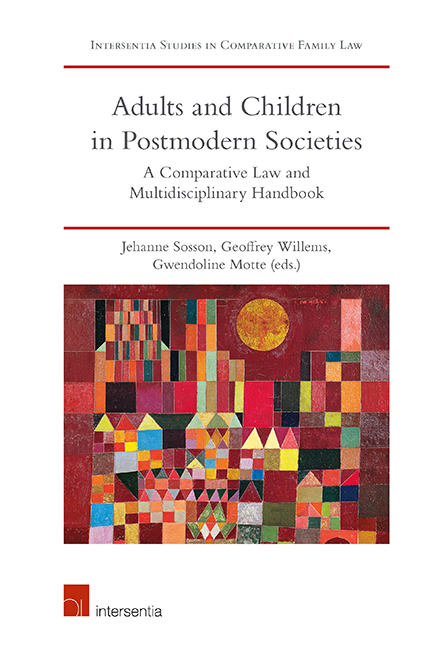Book contents
- Frontmatter
- Contents
- List of Cases
- List of Contributors
- Introduction
- PART I NATIONAL REPORTS ON LEGAL REGULATIONS OF RELATIONSHIPS BETWEEN ADULTS AND CHILDREN
- Questionnaire
- Models
- Algeria
- Argentina
- Australia
- Belgium
- Canada
- Democratic Republic of the Congo
- England and Wales
- France
- Germany
- Ireland
- Italy
- Japan
- The Netherlands
- Romania
- Spain and Catalonia
- Sweden
- Switzerland
- United States of America
- PART II INTERDISCIPLINARY APPROACH
- PART III INTERNATIONAL LAW INSIGHTS
- PART IV COMPARATIVE APPROACH
- General Conclusion: The Challenge of Transparent and Inclusive Parenthood/Parentality in a Pluralist and Cosmopolitan Context
- About the Editors
France
from PART I - NATIONAL REPORTS ON LEGAL REGULATIONS OF RELATIONSHIPS BETWEEN ADULTS AND CHILDREN
Published online by Cambridge University Press: 26 June 2019
- Frontmatter
- Contents
- List of Cases
- List of Contributors
- Introduction
- PART I NATIONAL REPORTS ON LEGAL REGULATIONS OF RELATIONSHIPS BETWEEN ADULTS AND CHILDREN
- Questionnaire
- Models
- Algeria
- Argentina
- Australia
- Belgium
- Canada
- Democratic Republic of the Congo
- England and Wales
- France
- Germany
- Ireland
- Italy
- Japan
- The Netherlands
- Romania
- Spain and Catalonia
- Sweden
- Switzerland
- United States of America
- PART II INTERDISCIPLINARY APPROACH
- PART III INTERNATIONAL LAW INSIGHTS
- PART IV COMPARATIVE APPROACH
- General Conclusion: The Challenge of Transparent and Inclusive Parenthood/Parentality in a Pluralist and Cosmopolitan Context
- About the Editors
Summary
CHANGES IN THE TRADITIONAL FAMILY
A. MOTHERS
1. Is maternity automatically established by the birth certificate?
Since 2005, maternity is automatically established with respect to the child where the mother is named on the birth certificate.
The birth certificate shall be issued within the five days following delivery. It is a mandatory requirement. It consists in the registration of the child's birth by the civil status services.
2. Does your jurisdiction recognise any kind of ‘anonymous childbirth’?
Since 1993, but consistent with the immemorial practice of secret delivery by women in need, the mother has ‘officially’ been granted the right to give birth anonymously so as to prevent any legal connection between the child and herself.
As a consequence, the child's birth certificate will be issued with no indication of the identity of the woman who has given birth. However, she is invited to leave information about herself and possibly her identity. The information will be passed on to the National Council for Access to Personal Origins.
3. If any kind of ‘anonymous childbirth’ is recognised, what rights does the natural mother have in respect of the child?
The woman who gives birth anonymously is not the legal mother of the child. She has no rights properly speaking in respect of the child.
This woman is also informed that she can, at any time, either transfer complementary information to the National Council for Access to Personal Origins or breach the secret about her identity, allowing the child to have access to it. The breach of the secret is a decision that belongs to the natural mother exclusively. Indeed, such information cannot be passed on to the child, even after her death, unless she has expressly consented to it. The breach of secret has no legal consequences in itself, as it does not allow filiation to be established between the child and his/her natural mother.
- Type
- Chapter
- Information
- Adults and Children in Postmodern SocietiesA Comparative Law and Multidisciplinary Handbook, pp. 249 - 284Publisher: IntersentiaPrint publication year: 2019



